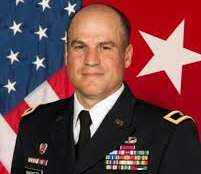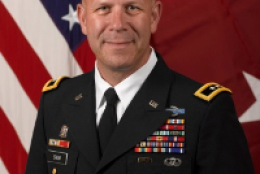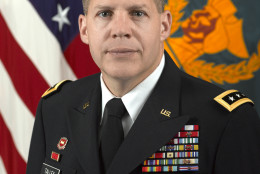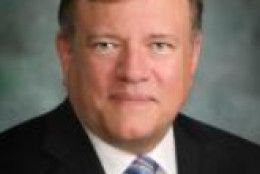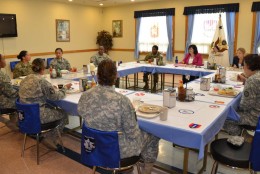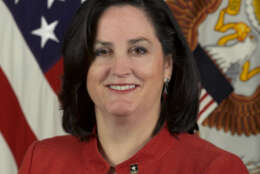On DoD
-
As the saying goes, nothing happens until somebody buys something. The Army spends tens of billions of dollars a year on everything from uniforms to combat vehicles. How it goes about acquisition, and moving all that material around the world, has a big impact on its effectiveness and readiness. Lt. Gen. Michael Williamson is the military deputy to the Assistant Secretary of the Army for Acquisition, Logistics and Technology. He joins Federal Drive host Tom Temin at the Association of the U.S. Army convention in Washington.
October 13, 2015 -
As the Army becomes more flexible and agile, commanders are considering mobility. That is, the vehicles necessary to take small, lethal units from one place to another, often under harsh, dangerous conditions. Brig. Gen. David Bassett is the program executive for the Army’s Ground Combat Systems. He joins Federal Drive host Tom Temin at the Association of the U.S. Army convention in Washington.
October 13, 2015 -
Presidents, members of Congress, veterans and many others call it the finest fighting force in the world. But the Army doesn’t stay that way by accident. Recruiting is a constant challenge, particularly as society and culture change. Maj. Gen. Jeffrey Snow is commander of the Army Recruiting Command. He joins Federal Drive host Tom Temin at the Association of the U.S. Army convention in Washington.
October 13, 2015 -
In recent years, the Army Reserve has provided important sustainment to the long ground wars in Iraq and Afghanistan and many other Army missions. Now the Reserve is focused on what’s ahead. Lt. Gen. Jeffrey Talley, commander of the Army Reserve, spoke to Federal Drive with Tom Temin, which broadcast live from the Association of the U.S. Army convention in Washington.
October 13, 2015 -
The Department of the Navy is taking the lead in the military by allowing personnel to wear fitness devices such as a Fitbit or Nike Fuel Band. Naval officials said they want to promote a "culture of fitness" while preserving a secure and classified environment.
October 09, 2015 -
The crisis points in the Middle East and the South China Sea are coming at an inconvenient time for the Navy. It's experiencing a carrier gap. Retired Vice Adm. Peter Daly is CEO of the U.S. Naval Institute; former deputy commander and Chief of Staff of U.S. Fleet Forces Command and former commander of the Nimitz strike group. He joined In Depth with Francis Rose to explain what the carrier gap is, why it's a problem and what the Navy and Congress can do to close it.
October 09, 2015 -
Retirement, benefits and pay were hot topics discussed by Chief of Naval Personnel Vice Adm. Bill Moran this week while speaking on the Navy’s All Hands Radio podcast.
October 09, 2015 -
The Army has released its new Energy Security and Sustainability Strategy, designed to enhance the force's readiness, capabilities, and performance. The strategy includes five goals. Katherine Hammack, assistant secretary of the Army for Installations, Energy, and Environment, was my guest to review each of the five goals, and explain how the Army will meet them.
October 06, 2015 -
The new Navy Cybersecurity division will be part of the headquarters staff, giving it reach both into the service’s resourcing decisions and its acquisition processes.
October 05, 2015 -
A new study by the Center for Strategic and International Studies found the Air Force's competition rate for service contracts dropped by 15 percent over the last six years, while other military services saw competition go up.
October 01, 2015 -
The Defense Department wants to make sure the electronic parts it uses aren’t tainted. In a new proposed rule expansion, DoD would require contractors to have a risk-based system to trace electronic parts from their original equipment manufacturer and subcontractors. The goal is to crack down on counterfeit electronic parts. Chris Myers is a partner and assistant chair of the Government Contracts Group at Dentons. He joins the Federal Drive with Tom Temin with more on the proposal.
September 30, 2015 -
Thursday isn't just the beginning of the new fiscal year. It's the first day of Energy Action Month. It's an important month for the Army. Katherine Hammack, assistant secretary of the Army for Installations, Energy and Environment, tells In Depth with Francis Rose why Energy Action Month matters to the Army and what it will mean for the force's mission.
September 30, 2015 -
More cadets at West Point suffer concussions from mandatory boxing classes than from any other activity, including football. When The New York Times wanted to learn more about why, the Army appeared to prevent the Times from getting the information its reporter wanted until it could try to convince The Wall Street Journal and USA Today to run stories that supported its position on concussion research. Neither newspaper ever ran a story like that. Phil Carter, is retired from the Army retired and is a senior fellow, counsel and director of the Military, Veterans and Society Program at the Center for a New American Security. He told In Depth with Francis Rose these stories are important for a couple of reasons.
September 30, 2015 -
Defense Department Chief Information Officer Terry Halvorsen made some waves earlier this year when he said he’d like to see commercial companies construct and operate data centers on DoD property. The military would provide physical and cyber security, while the firms would bring the cost and scalability benefits of cloud technology. Now, the Army is ready to try out a version of that idea. Federal News Radio's DoD reporter Jared Serbu writes about this in the latest edition of Inside the DoD Reporter's Notebook.
September 29, 2015 -
The Air Force told Congress in a new report that the Distributed Common Ground/Surface System Analysis and Reporting Team (DART) still is doing its assigned job, despite lawmaker concerns.
September 29, 2015


